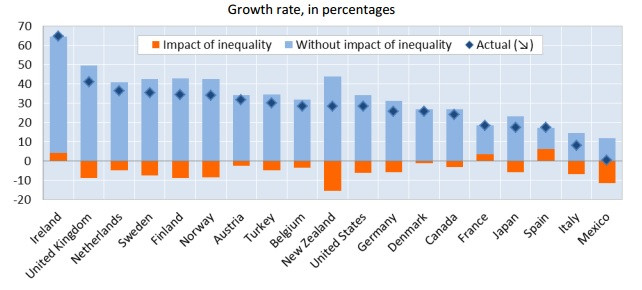Income inequality significantly damages economic growth, warns OECD

Income inequality does damage economic growth, according to new research from the Organisation for Economic Co-operation and Development (OECD).
The French based thinktank said one reason for the phenomenon is that poorer members of society are less able to invest in their education.
The OECD warned that the gap between rich and poor is at its highest level in most OECD countries in 30 years.
For example, the richest 10% of the population in the OECD area earn 9.5 times more than the poorest 10%.
In contrast, in the 1980s the ratio stood at 7:1.
The analysis from the OECD found income inequality has a negative and statistically significant impact on medium-term growth.
Rising inequality by three Gini points (a broader measure of inequality which ranges from zero, where everybody has identical incomes, to one, where all income goes to only one person), would drag down economic growth by 0.35% per year for 25 years.
The organisation said this would create a cumulated loss in GDP at the end of the period of 8.5%.
For individual countries this means rising inequality is estimated to have knocked more than 10% growth in Mexico and New Zealand between 1990 and 2010, nearly 9% in the UK, Finland and Norway and between 6 and 7% in the United States, Italy and Sweden.
On the other hand, greater equality prior to the crisis helped increase GDP per capita in Spain, France and Ireland.
"This compelling evidence proves that addressing high and growing inequality is critical to promote strong and sustained growth and needs to be at the centre of the policy debate," said Angel Gurría, the secretary general of the OECD.
"Countries that promote equal opportunity for all from an early age are those that will grow and prosper."
The study recommended that anti-poverty programmes will not be enough to tackle inequality.
The thinktank urged policy makers to increase access to public services, such as high-quality education, training and healthcare, constitute long-term social investment to create greater equality of opportunities in the long run.

© Copyright IBTimes 2025. All rights reserved.






















